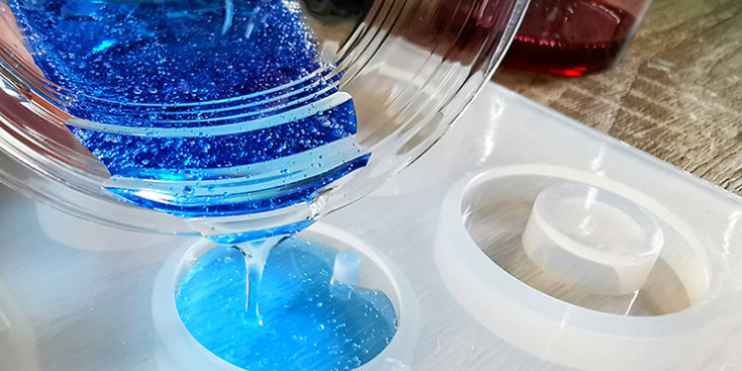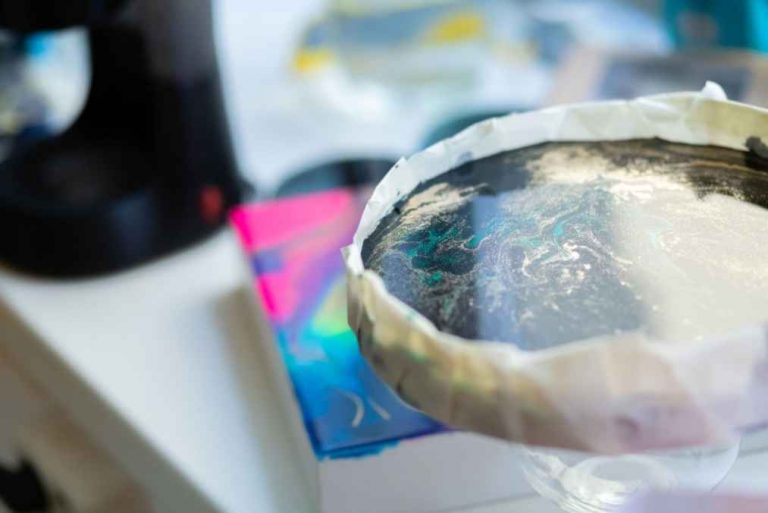Many people are familiar with epoxy resin and acrylic, but they might not know the difference between the two. Yes, you heard me right. Epoxy resin and acrylic resins have some differences.
Acrylic resin, often called polyacrylate, is a type of thermoplastic that is derived from methacrylic acid, acrylic acid, and other similar compounds. They are used to create various objects such as sculptures or jewelry. Epoxy resin is a type of adhesive that can be used to glue many different types of materials together.
Both substances have their own pros and cons, so you will need to weigh them against one another when choosing which material will work best for your project!
So in this Epoxy resin vs Acrylic comparison post, we’ll take a more detailed look at both of these products.

Acrylic Resin
Acrylic resin has become more popular in the solid surface manufacturing industry. It has a number of benefits, including the fact that it can be heated, stretched into form, and cooled without having a physical impact on it, making it much more durable than polyester ever was.
Acrylic is a thermoplastic resin that can be manipulated and heated regularly. This is because the resin has high heat resistance. On the other hand, acrylic resins are made from a mixture of acrylic polymer, methyl monomer, and dry powder.
Acrylic dust and its vapors are toxic, mainly the organic peroxides. They might even cause explosions and in some cases instant blindness if they get into your eyes.
Epoxy Resin
Epoxy coating resin is a two-part clear liquid and is an adhesive material that can be used on many different types of materials. It is also known for its fast curing process or cure times and strength in bonding two items together; no matter what type they may be!
Even though you might know a lot about epoxy resin already, we’ll try to focus on the main points. By doing this, we can establish and highlight the differences between it and Acrylic Resin more clearly.
As stated previously, we know how acrylic resin can be heated but in this case, epoxy is a type of resin that uses heat to solidify into a mass. This mass won’t melt down easily. Here, the epoxy resins function as thermosetting plastics.
Plus epoxy resin doesn’t smell as bad as acrylic and emits much lower amounts of caustic vapors and organic compounds.
When compared with acrylics, epoxies have some benefits that you might not be aware of! They can fill gaps better than other types of adhesives can, and they work well with a variety of different surfaces. They’re extremely durable when cured properly, so you’ll have an incredibly strong bond after just one application!
Frequently Asked Questions
Below are some of the most common questions people have regarding Epoxy resin vs Acrylic Resins and answers to them
What are the surfaces that epoxy resin won’t get stuck in?
The surfaces that epoxy resin won’t stick are Masking tape, greasy surfaces, silicone, wax, and plastic.
How should you use epoxy resin in wood?
Well, if you intend to use epoxy resins on wood, first, clean and dry up the sections. Then, pour in epoxy resin because that’ll not cause any bubbles to form. And, if bubbles do end up forming, take a sharp stick and remove the bubbles.
How do you polish a surface that’s covered with epoxy resin?
Clean off the area, and dry it. Then, start with applying the polishing compound in the area. Here, you’ll need to use a microfiber cloth and start slow. You can also use a polishing tool if you want as well
Can epoxy resins be removed?
Yes, even though it’s a bit hard to remove epoxy resin, you can still do it. The process is pulling and scraping, using a heat gun.
Wrapping Up
So in the end, epoxy resin is more of a permanent solution whereas acrylic can give you better results if you need something that’s going to hold strong for a long time but only needs temporary use or won’t get handled much like your art pieces.
Well, that’s all we have for you in this article. Hopefully, you’re now well aware of the uses of epoxy resin in different professions. We showed you all the uses and types of epoxy resin. And most importantly we discussed the difference between epoxy resins and acrylic resins.
So, now that you know about the uses, why not start working with it? Good Luck!




